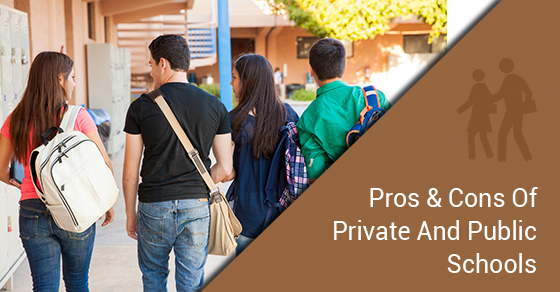


Education is an invaluable tool for preparing children for successful lives. But for many parents, finding the right learning environment involves more than simply selecting the nearest public school. Parents are increasingly aware of the importance of accounting for learning differences in the classroom environment. Yet not all schools are capable of meeting the needs of individual students adequately.
Questions arise each day about school quality, curriculum, accountability, and teacher training, with major differences being reported between public schools and private schools. Public schools, for instance, are more likely to face budget cuts than private schools, which leads to fewer resources and larger class sizes.
Private schools, on the hand, continue to flourish. But with their high tuition fees, some parents may not be able to give their children what they consider to be the best learning environment. But are private schools always different from public schools? Are they worth the extra cost? And how do you determine the best school for your child?
Where You Live Matters
Although all public schools are tax-funded, some of them are considerably better than other. This is partly because of the disparity of school governance and funding. The type and quality of the local schools also depends on your school district.
Some areas have more public high schools than others, as well as magnet or charter schools that offer enhanced or targeted educational programs. Your teen may fit better in any of the latter two from both an academic and personal perspective. If your district allows it, you may also consider sending your teen to a school that’s outside your geographical area.
If there are no good schools in your district, and your teens are only allowed to enrol in schools within your geographical area, you can always make the radical decision to move to a better district for a chance to give your children a better run at a more successful life.
Are Private Schools Better?
Although the distinction between private and public schools is not as apparent as it once was, most people assume that private schools offer a more conducive learning environment than their counterparts do. But this is not necessarily true.
For instance, some public schools – such as charter schools – offer regulation exemption, flexible curriculum, and other perks associated with private schools while providing free tuition. Similarly, magnet schools have high academic standards that make them as competitive as private schools.
Private schools also have a number of benefits, including:
What Kind of Student Is Your Child?
As your child grows, you will be better able to tell his or her strengths and weaknesses as a student. Generally, bright, self-motivated students tend to do well regardless of the learning environment. But students who have difficulty concentrating and seem less motivated may need a smaller classroom or a more structured learning environment where they can get more individual attention.
Comparison
| Public Schools | Private Schools |
|---|---|
| No tuition to enroll | Require tuition to enroll |
| Funded by government via taxes | Funded independently via tuition, alumni, grants, community |
| Must follow regulations | Does not necessarily have regulations |
| Teachers must be certified | Don’t require teachers to be certified |
| Minimal flexibility with curriculum | Flexible curriculum |
| Larger classes | Smaller classes |
| Have special education programs | May not necessarily have special education programs |
| Admit all students | Choosy with student admissions |
The biggest motivator for enrolling in a public school is the prospect of saving money. They are also held to high standards, such as the requirement for teachers to be certified, and special education programs to cater to students with different learning needs. On the other hand, they are faced with greater bureaucratic red tape as far as rules and regulations go.
Parents may choose private schools for any number of reasons, including the desire for single-gender education, religion, or the perception of a more flexible curriculum. While the independence to customize their own curriculum may be an attractive feature, it may also lead to lower learning standards.
Also keep in mind that private schools are not mandated to hire certified teachers, and they don’t always provide programs to cater to students with special needs. Nevertheless, private schools are recognized for their ability to produce higher standardized test scores.
Verdict: The Quality of the School Matters the Most
For students who intend to pursue higher education, what matters most is their standardized test scores, GPA, and extracurricular activities – not the high school they attended. Do your research and enrol your teen in a school that is likely to raise his or her university acceptance.